OSR Masters: 4 growers on how they get oilseed rape off to the best start
Since good establishment of oilseed rape is essential for high yields we look to pick up some tips by following four growers to see how they get their crops off to the very best of starts using different cultivation techniques.
In the first article of this new series, we introduce the approaches taken by these four, as they balance yield potential with production costs and likely establishment challenges.
Over the next few months, we will be following their progress throughout the season in our new OSR Masters series and into the next cropping year.
Read all of the articles in the OSR Masters series
David Lord, Lord & Hunt, Clacton-on-Sea, Essex
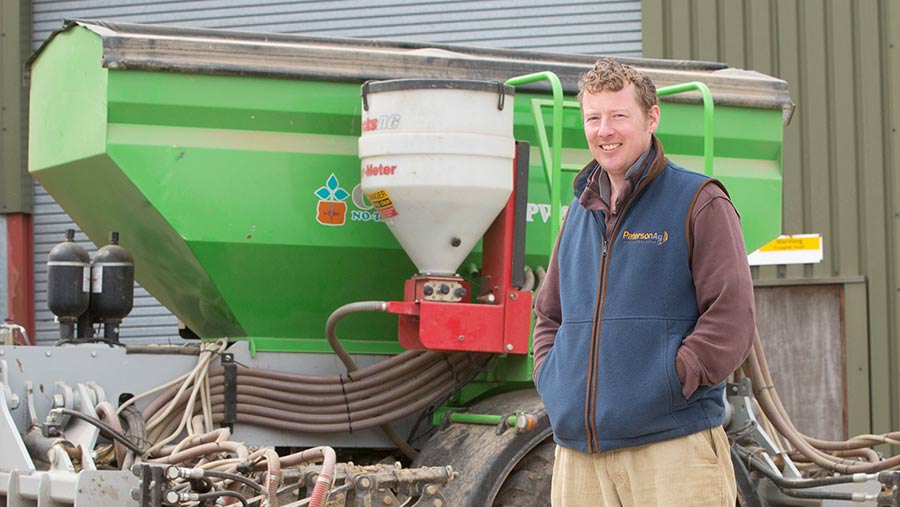
© Tim Scrivener
Changing from minimal tillage to a no-tillage system has reduced the costs of growing oilseed rape on an Essex farm by a third, without hitting yields.
The move to direct drilling by family partnership Lord & Hunt, which farms 600ha from its Clacton-on-Sea base, has also helped with soil moisture retention and improved the timeliness of oilseed rape establishment.
Since buying a Cross Slot drill in 2015 and combining minimal soil disturbance with companion crops and residue management, the business has used fewer oilseed rape herbicides and eliminated insecticide use in the crop – with the only increase being the use of more slug pellets.
“We’ve always grown oilseed rape here, but never intensively. We don’t have the flea beetle pressure that others do, so any damage has been minor. The main establishment hurdle is pigeons, which tend to hit after the companion crop has been taken out,” said grower David Lord.
Growing 70ha of oilseed rape this year, he has the high-erucic-acid rapeseed (Hear) variety Palmedor in the ground, to try to add value to the crop through its £35/t premium for use in industrial markets, along with a small area of hybrid variety Exclaim.
“We struggle to get our average oilseed rape yield over 4t/ha. So, we’re trying Hear oilseed rape this year, as a way of lifting performance,” he said.
These have replaced Clearfield varieties, which were originally introduced to help overcome a charlock problem but became superfluous after direct-drilling reduced broad-leaved weed emergence.
All of the rapeseed is companion cropped with berseem clover, to help with soil structure and reduce pigeon damage, as the birds struggle to find landing places where it is being grown. This, along with blackgrass, is taken out with Astrokerb (propyzamide + aminopyralid) – the only herbicide the crop receives.
In the dry conditions of east Essex, the drilling date is determined by soil moisture, usually starting on 20 August and continuing into early September. As well as the clover, starter fertiliser is applied with the seed, to take account of the lack of soil mineralisation with direct drilling.
Whizz Middleton, T.C. Shaw & Sons, Lilley, Bedfordshire
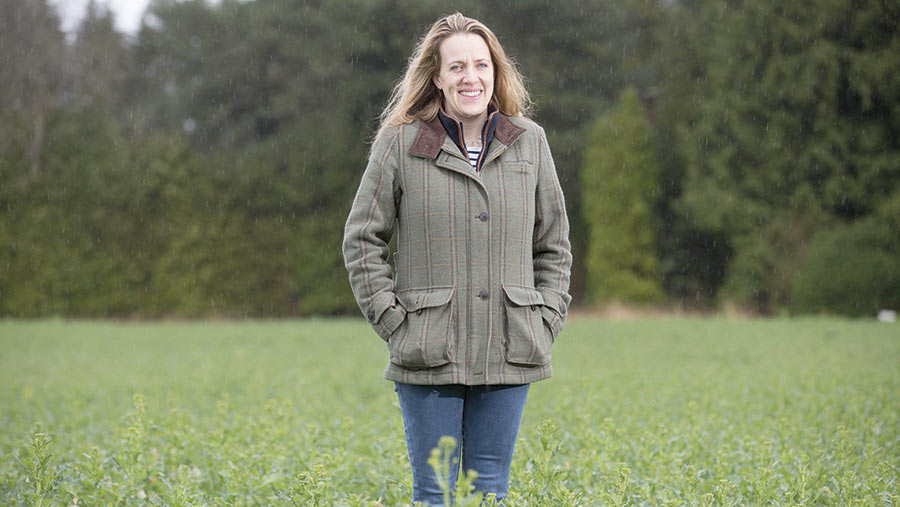
© Tim Scrivener
Oilseed rape has been grown by T.C.Shaw & Sons on the Bedfordshire-Hertfordshire border since the early 1970s, with a specialist retail venture being introduced by Whizz Middleton and her sister, Ellie Michell, almost six years ago.
Since then, cold-pressed rapeseed oil has been produced from the family farm at Lilley, under the brand name Mrs Middleton’s, with nearly 10% of the total oilseed rape area being used to create the award-winning culinary oils, salad dressings and mayonnaise.
Sold through local and national stockists and at farmers’ markets, as well as into the restaurant trade, each bottle details the name of the field that it came from, as well as its OS grid reference number.
This means that attention to detail has become their mantra, as any changes to the crop’s management could affect the oil’s taste and disrupt sales to their loyal customer base.
“Our oil has been recognised by the Great Taste Awards, so everything that we do – from field selection and agronomy to harvest management and storage – is important for the consistency of the product,” said Mrs Middleton.
“We are also members of LEAF, which helps demonstrate our commitment to the environment,” she said.
As a result, the 18ha of oilseed rape being grown for oil production is all in the proven variety PT256, while the farm’s remaining 87ha of the crop is down to new Clearfield varieties, with most being Impressario CL.
The decision to switch to herbicide-tolerant Clearfield types was made in conjunction with the farm’s agronomist Chris Bumford of advisory group ProCam, as a cruciferous weed burden and legacy of sulfonylurea herbicide use were threatening the crop’s establishment and driving up herbicide costs.
Establishment technique has come full circle – Mrs Middleton’s father Brian was direct drilling in the 1970s, before moving to min-tillage and then trying subsoiling establishment. Today, the crop is direct drilled with a Horsch Sprinter in the first week of August, so that soil moisture is retained.
Sam Paske, Hail Weston Farms, St Neots, Cambridgeshire
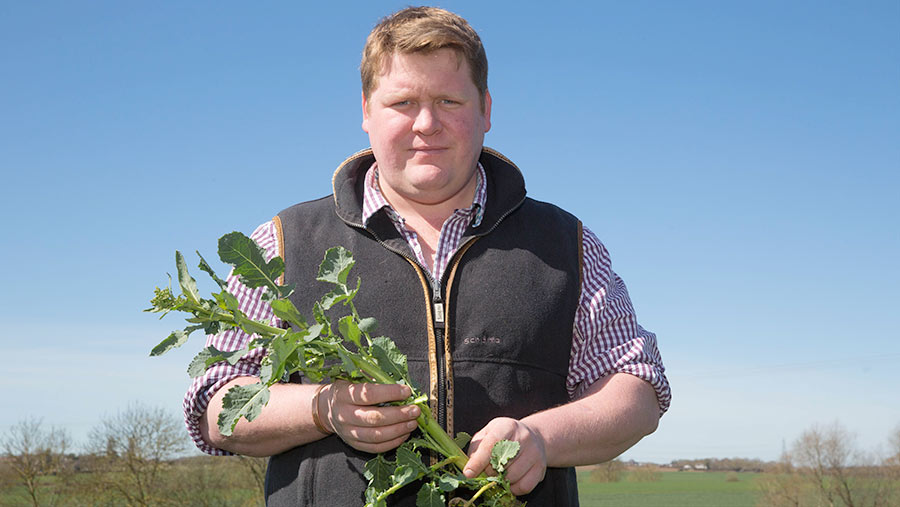
© Tim Scrivener
Determined efforts to improve oilseed rape performance have been paying off for Cambridgeshire farm manager Sam Paske.
Since taking up the reins at Hail Weston Farms Ltd near St Neots, he has seen yields start to rise and costs begin to fall on the 135ha of winter oilseed rape grown by the business, which is spread across five farm sites.
The introduction of a new establishment system and scrutiny of variable costs are responsible for better results from the crop – with one pass now being used to get the crop into the ground and home-saved seed featuring strongly.
“The first six weeks are the most important with oilseed rape, so that’s been our focus. Last year, we achieved some of the best yields ever produced here,” said Mr Paske.
Conventional varieties are grown, so that seed costs can be kept in check. In the ground this year is Picto, as well as two newcomers to the farm, Elgar and Flamingo.
Mr Paske has a target drilling date of mid-August and uses a seed rate of 5kg/ha, with workshop skills being put to good use to fit a Techneat Terracast seeder on the back of a Horsch Tiger cultivator, to create a one-pass establishment system.
“We need to tweak it a bit for the coming year. The planned modifications will make it a bit more weatherproof and improve the accuracy of seed placement – we ended up having to drill some of the current crop at the end of August with our Horsch Sprinter after it turned wet,” he says.
Flea beetle is his biggest establishment headache, with two insecticide sprays used in autumn 2017 and the crop being rolled twice. Ferric phosphate-based slug pellets are broadcast at drilling and diammonium phosphate (DAP) fertiliser is used in the autumn.
Philip Woods, DH Woods & Son and PR Farming, Kensworth, Bedfordshire
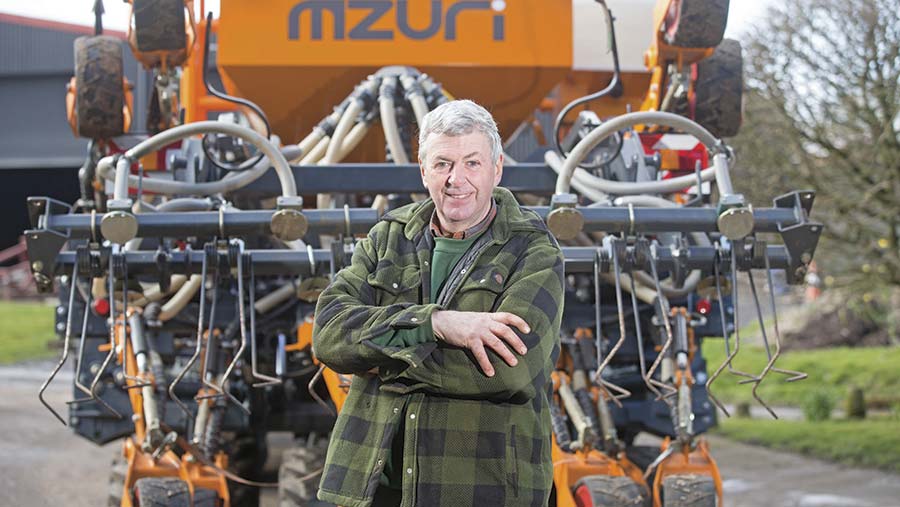
© Tim Scrivener
Greater precision is helping grower Philip Woods improve oilseed rape establishment on the mainly heavy soils that he farms in Bedfordshire.
With 280ha of oilseed rape in the ground across five farm locations, he matches variety choice to drilling date and aims to get as much of the crop as possible up and away in early to mid August, to take advantage of warmer temperatures.
A move to strip tillage has allowed drilling to become a one-man, one-pass system, leaving the ground undisturbed except for a narrow strip of soil, and retaining crop residues.
It also allows companion crops and DAP fertiliser to be included at drilling, with slug pellets going down the same day.
“With good germination, we will see cotyledons within 24 to 48 hours. The more rapidly we can get the crop going, the more likely it is to succeed. The main threats at this early stage are flea beetle, slugs and pigeons,” he said
On the family farm, D.H.Woods & Son in Kensworth, he is currently growing 50ha of hybrid variety Extrovert, with precision farming technology used to alter seed rates on the move according to soil zones, to reduce variation and give a more even crop.
On four other neighbouring farms, where he operates contract farming arrangements as P.R Farming Ltd, conventional varieties Django and Barbados were drilled in early August, using higher seed rates.
Adopting low disturbance strip tillage has allowed him to reduce growing costs, cutting out pre-emergence herbicides and using one application of slug pellets.
With the help of independent agronomist Damian McAuley of Indigro, best use is being made of variable rate seed and fertiliser, including nitrogen and plant growth regulators.
“We are targeting the inputs to where they are needed, giving the crop every chance of fulfilling its potential,” he said.
Sponsor’s message
Making good decisions that protect farm businesses from risk is now every bit as important as driving up output or improving efficiency.
Corteva Agriscience’s product pipeline has been developed to help farmers be more successful in what they do and Arylex Active in oilseed rape facilitates a revolutionary approach.
It allows growers to see a crop emerge before spending any money on controlling the weeds within it. No more high-risk front loading of crop protection products, an end to spray and pray.
The farmers who will be successful in the future are the ones who can see a new way forward & we’re looking forward to seeing how this project evolves throughout the course of the year.
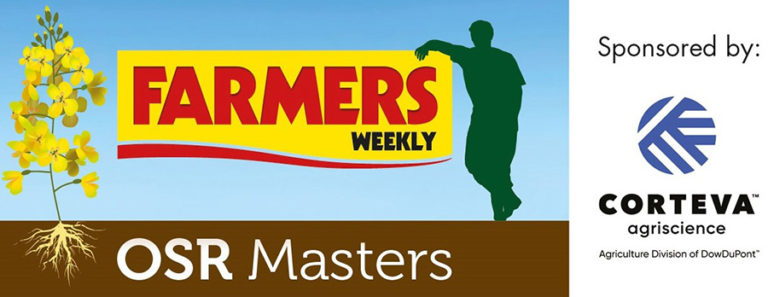
Thanks to Corteva Agriscience for its sponsorship, which enabled us to run OSR Masters. Farmers Weekly had complete editorial control of this report.

